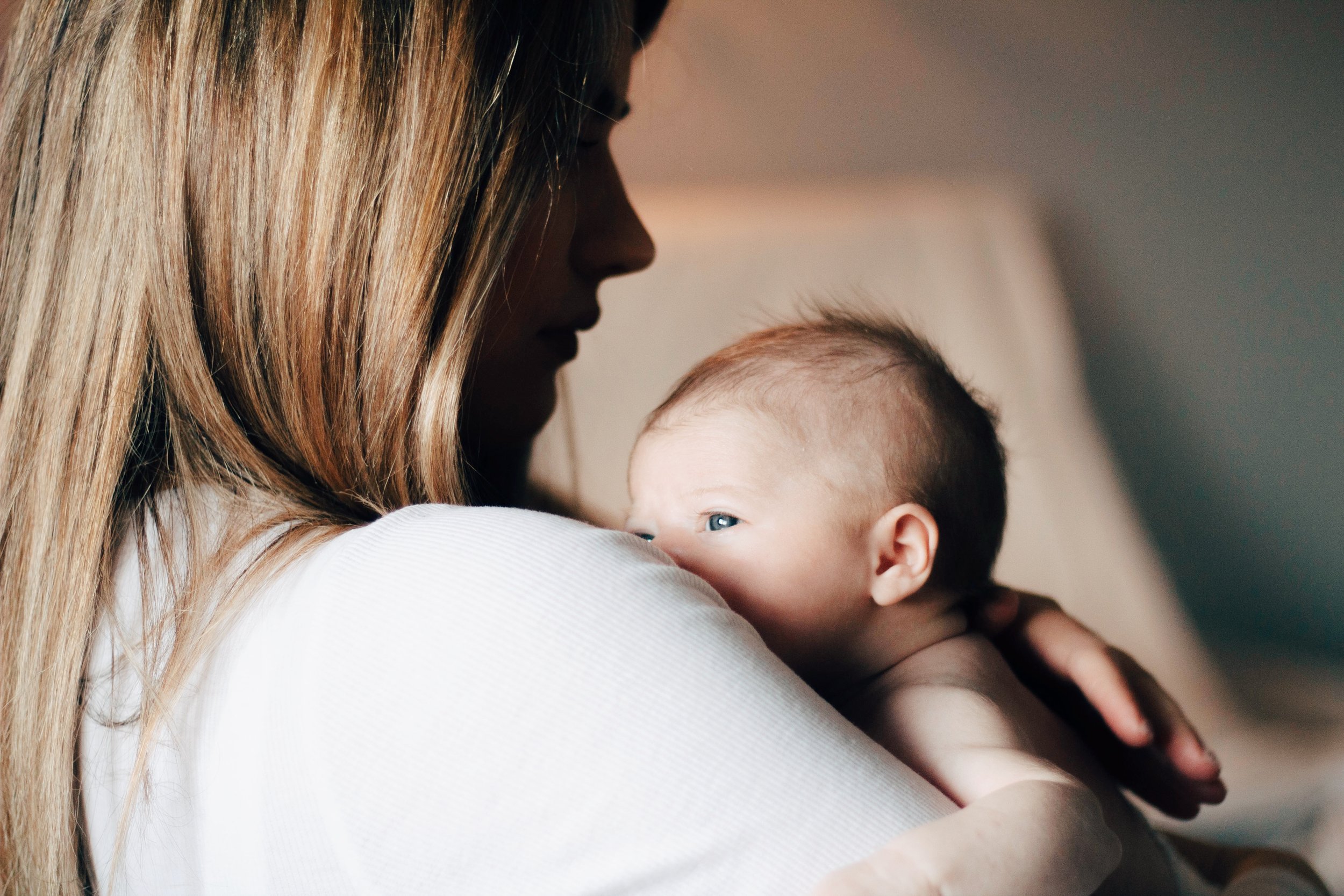Postpartum Depression: How Long Does It Last?
Takeaway: Becoming a new mom can be both exciting and overwhelming at the same time. The experience can be even more intense if you’re experiencing postpartum depression. In this post, I’ll break down everything you need to know about how long postpartum depression lasts, what exactly it is, and postpartum depression recovery tips.
WHAT IS POSTPARTUM DEPRESSION?
Many new moms struggle to adjust to life after pregnancy. After all, everything changes when you welcome your little one into the world. Studies show that more than half of new moms experience something called the "baby blues" as they adjust to parenthood.
Baby blues are common in the days after giving birth, but they typically go away within a couple of weeks. The baby blues can look different from person to person. However, they typically consist of symptoms such as feeling sad or anxious, having trouble sleeping, appetite changes, crying, and feeling overwhelmed.
Postpartum depression can be mistaken for the baby blues at first since they share many of the same symptoms. However, postpartum depression lasts longer than the baby blues and the symptoms tend to be much more intense.
POSTPARTUM DEPRESSION SYMPTOMS
Statistics show that about 1 in 7 new moms experience postpartum depression. Each person's experience is different, and you don't have to have every symptom in order to experience postpartum depression. With that being said, some of the common symptoms include:
Feeling depressed or experiencing severe mood swings
Excessive crying spells
Having trouble connecting with your baby
Feeling overwhelmed, worthless, or guilty
Pulling away from loved ones and feeling disconnected from yourself
Changes in sleep patterns, including sleeping too much or too little
Low energy or not enjoying the things that used to bring you pleasure
Feeling anxious, irritable, or angry
Difficulty concentrating
Changes in appetite, including eating too much or too little
If you have symptoms of postpartum depression, it's best to consult with your medical provider or a licensed mental health professional. They may use tools such as the Edinburgh Postnatal Depression Scale to help determine whether you have postpartum depression. From there, they can help give you the appropriate treatment to help you feel better-and less alone.
RISK FACTORS FOR POSTPARTUM DEPRESSION
Experts aren't entirely sure what causes postpartum depression. It's likely that there are multiple contributing forces that come together to trigger it. Here are just a few risk factors that may increase your chance of developing postpartum depression.
Experiencing baby blues
Research suggests that postpartum depression is more common amongst women who have experienced baby blues. In fact, it may be anywhere from 4 to 11 times more common, making baby blues a significant risk factor to develop postpartum depression symptoms.
Prior mental health conditions
If you already experienced depressive symptoms or symptoms of anxiety before giving birth, you may be at a higher risk to develop perinatal depression. You may also be at a greater risk if you have a family history of mental health issues.
Unexpected changes to your birth plan
Many moms devote a significant amount of time and intention to creating a birth plan that feels good for them. It makes sense that having to unexpectedly change your birth plan at the last minute could contribute to postpartum depression.
For example, studies show that moms who felt strongly about having a natural birth were more likely to develop postpartum depression if they had to have a cesarean section.
Preterm delivery
In that same vein, research suggests that giving birth earlier than expected may also contribute to postpartum depression. Typically, a preterm delivery is unexpected, and can often come with unforeseen medical issues for mom and/or baby, so it makes sense that this could lead to emotional challenges.
Lack of emotional support
Unfortunately, some women may have limited support from their loved ones during the course of their pregnancy and beyond. Also, some women may have a relatively small or nearly non-existent support network. This lack of support may put women at increased risk of postpartum depression.
Life stressors
The time after giving birth can be stressful enough. However, if there are other life stressors present such as relationship issues, financial problems, or career uncertainty, a woman's risk of postpartum depression may increase.
HOW LONG DOES IT TAKE TO RECOVER FROM POSTPARTUM DEPRESSION?
There is no direct answer to the question "How long does postpartum depression last?". Some studies suggest that up to half of moms with postpartum depression have symptoms lasting six months or longer. Other research shows that a small percentage of women with postpartum depression may experience symptoms for up to three years after giving birth.
Stigma and lack of access to treatment options can prevent women from seeking help, which makes it difficult to gather data about postpartum depression and how long it lasts. More research is needed to gain a better understanding of postpartum depression and how long it can take to recover.
FACTORS THAT CAN INFLUENCE HOW LONG PPD LASTS
Many of the risk factors that may make you vulnerable to developing postpartum depression can also contribute to how long it lasts. While there is no way to know for sure how long it will take you to recover from postpartum depression, these factors may play a role.
Delaying treatment
Untreated postpartum depression may be unlikely to resolve on its own. In fact, one study suggests that putting off getting help may be the biggest contributing factor to how long postpartum depression lasts. This shows how important it is to receive prompt treatment for your mental health.
Lack of social support
Just as having little support from loved ones can be a risk factor for developing postpartum depression, it can also contribute to how long it lasts. Family and friends may encourage you to receive treatment if they see you struggling-without that encouragement, it might be more difficult to reach out. It might also feel more difficult to find time to access care if you don't have help.
Pregnancy complications & medical issues
If you or your baby had medical issues during your pregnancy or delivery, it might be harder to adjust during the postpartum period. It can be really scary to experience unforeseen medical issues, and it can take a toll on your mental health.
It can also make it harder to bond with your baby if you have medical complications that prevent you from being present in the way you want to be. For example, if you're having trouble breastfeeding even though you really wanted to, this can make the postpartum period more difficult.
Life stressors
Experiencing life stressors can contribute to both the onset and the duration of postpartum depression. Challenges like moving, job changes, relationship struggles, and more can be stressful enough as is, let alone when you're trying to adjust to being a new parent.
These stressors can also make it difficult to prioritize getting treatment, and the delay in getting help can make postpartum depression symptoms worse as well.
RECOVERING FROM POSTPARTUM DEPRESSION
The symptoms of postpartum depression are intense and can last a significant amount of time. Thankfully, postnatal depression is highly treatable. With the right support, you can start feeling like yourself again.
POSTPARTUM DEPRESSION RECOVERY TIPS FROM AN EXPERT
There is no "one-size-fits-all" treatment for postpartum depression. It's best to work with your healthcare professional to make a treatment plan that makes sense for your unique situation, needs, and goals. Here are some ways that new moms get support for their mental health post-pregnancy.
Explore support groups & group therapy
Many women enjoy the camaraderie that support groups and group therapy can give them. Connecting with other moms who are experiencing the same thing can be incredibly validating and healing.
My group counseling program in Los Angeles is designed especially for pregnant women and new moms to help them prepare for the postpartum period and adjust to life with a new baby. This is a major life change, and getting support from other women can be really helpful.
Try talk therapy
Individual therapy is another great option for coping with postpartum mood disorders, anxiety, and other perinatal struggles. While groups are a good way to remember that you are not alone, it can also be helpful to have personalized support.
As a postpartum therapist in Los Angeles, I help new moms adjust to this new chapter of life. Together, we can find new ways to support your mental health, explore all of the complicated emotions that come with being a new parent, and even process the physical changes that pregnancy and birth can bring.
Consider medication to manage symptoms
Some women choose to take medication to help ease their postpartum depression symptoms. If you're interested in this option, it's best to consult with your women's healthcare professional or primary care physician.
While medication isn't for everyone, it can be a lifesaver for many people. It can help manage symptoms like depressed mood, mood swings, anxiety, appetite problems, irritability, sleep issues, and more.
Listen to a podcast
While proper medical care and mental health support are essential to your recovery journey, additional resources can also be helpful. Podcasts are a great option for many women, especially with limited time as a new mom. You can listen to them as you do other things around the house.
There are tons of different postpartum podcasts for new parents, so try a few and find which ones you like best. Here are just a few to get you started:
Access online resources
Getting support from the comfort of your own home can make things just a bit easier on new moms. While informal resources aren't a substitute for working with your healthcare provider or mental health clinician, they can be a helpful addition to your recovery.
Postpartum Support International (PSI) has tons of great online resources that can help you feel better, including virtual support groups, live phone chats with postpartum experts, and a helpline to help you get even more support.
GET SUPPORT IN YOUR POSTPARTUM DEPRESSION RECOVERY WITH THE HELP OF A POSTPARTUM THERAPIST IN LOS ANGELES
Whether you're a new mom or have navigated a previous pregnancy, I'm here to help. Postpartum depression can be an incredibly overwhelming, isolating experience, and you shouldn't have to go through it alone.
Postpartum therapy in Los Angeles can give you the support you need to adjust to life post-pregnancy and thrive in this new chapter of your life. Reach out today to start the process by scheduling your free consultation.


